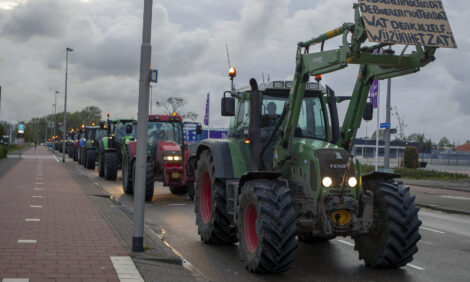



Canterbury Farmers Increase Effluent Compliance
NEW ZEALAND - Canterbury dairy farmers have raised the bar once again with effluent compliance, according to figures released by Environment Canterbury.Preliminary monitoring figures for the 2010/11 dairy season (to the end of May) show that 65 per cent of Canterbury dairy farms were fully compliant with effluent discharge consent or permitted activity conditions. This is a shift from 59 per cent last year, and 43 per cent in 2008/09.
For three years, a working group from DairyNZ, Federated Farmers, Fonterra, Synlait, NZ Dairies and SIDDC have been working with Environment Canterbury to provide tailored advice and information on effluent management to the region’s dairy farmers. AgITO have also recently joined to further strengthen these initiatives.
DairyNZ strategy and investment leader (Sustainability) Dr Rick Pridmore says the latest results illustrate the success an industry-wide approach can have and the real efforts farmers are putting in on a daily basis to ensure their systems are operating well.
“We’ve seen improvements year after year now, which is really great to see – the hard work being done out on farms is really paying dividends and this progress is important for our industry,” says Dr Pridmore.
Environment Canterbury, which visited 900 dairy farms this season, also found minor non-compliance has fallen to 26 per cent, from 33 per cent. Common issues are an incomplete management plan or minor ponding.
However like last season, significant non-compliance was again 9 percent. Effluent ponding, discharging effluent too close to a waterway and nitrogen overloading are common issues for significant non-compliance.
Federated Farmers senior policy advisor Lionel Hume says the results show farmers are more aware of their responsibilities and how to manage their farms in a compliant way.
“Farmers are looking carefully at their farm systems and how they operate them,” says Mr Hume. “Of course, effluent management isn’t just about compliance – it is valuable as a fertiliser and ultimately is a cost-efficient farm resource – so it makes sense to make good use of it.”
Fonterra sustainable dairying specialist Libby Sutherland says farmers have been receiving more information and advice on how to manage their effluent systems, which has had a real impact. Fonterra’s Every Farm Every Year programme was also identifying farms at risk of non-compliance and working with farmers to improve effluent systems.
“Just having the support of someone on your farm, walking through the issues can make a real difference, especially in understanding local rules and specific concerns. As an industry, we’ve made great steps in providing more information and resources to help them achieve compliance and the aim is to have farms which work within the rules 365 days a year.”
Synlait environmental manager Lucy Bowker has been working closely with Synlait farmers on environmental management. “This year’s results show we are heading in the right direction, making some real improvements in systems on-farm and, therefore, nutrients are being well managed and utilised.”
New Zealand Dairies supplier liaison officer Jason Gooch says another aspect has been the involvement of supporting industries, such as effluent equipment designers and suppliers. “Everyone has a key role to play and being able to get expert advice really helps make decision-making easier, which ultimately flows on to how the system works on a day-to-day basis out on farm.”
The industry has also recently introduced a code of practice for effluent design to further support farmers’ goals of full compliance across their industry.
TheCattleSite News Desk


